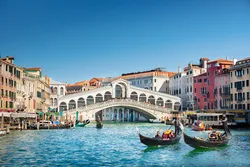See all articles relating to: Italy
Italy is a country with a long and fascinating history. It was the birthplace of Ancient Rome, a civilization whose impressive architecture, engineering, and military prowess played a significant role in shaping Western culture. Today, Italy is home to countless historical and cultural landmarks, including the Colosseum, the Vatican, and Pompeii, among many others. Italy has also played a crucial role in developing the arts, producing some of the world's most influential figures in literature, art, and music. Italian Renaissance artists, such as Leonardo da Vinci, Michelangelo, and Raphael, created some of history's most iconic works of art. Italy's scientific contributions are also notable, with Galileo Galilei significantly contributing to physics and astronomy. Italy is also known for its culinary traditions, with Italian cuisine being enjoyed around the world. Italy is a modern and dynamic country with a thriving economy and vibrant culture.
Research your ancestors on MyHeritage
Researching family history in ItalyResearching family history in Italy

See also: Italian genealogy
Researching family history in Italy involves navigating the country's rich and complex history. Due to Italy's history of political fragmentation, records may be scattered across different towns, regions, and even countries, making accessing and interpreting them challenging. Key sources of information include vital records, military records, census records, and immigration records, which can be found in various archives and repositories throughout Italy and around the world.
Italian ethnicityItalian ethnicity

See also: Italian ethnicity, Greek and South Italian ethnicity
Italian ethnicity refers to the cultural and ancestral identity of individuals who trace their heritage to Italy. Italy has a diverse ethnic makeup, with various groups and communities inhabiting the country throughout history. The ancient peoples of Italy included the Etruscans, Greeks, and Romans, while the Middle Ages saw the arrival of Germanic and Slavic tribes.
Italian surnamesItalian surnames

See: Italian surnames, Italian military records
In Italy, surnames traditionally come from the father's family name and are passed down through generations. Surnames often reflect regional or occupational origins, with many names being specific to certain regions or professions. For example, names ending in "-ini" or "-etti" are common in Tuscany, while names ending in "-o" or "-i" are common in southern Italy. Knowing the meaning and origin of an Italian surname can help researchers trace their family's migration patterns and locate records in specific towns or regions. Additionally, variations and misspellings of surnames can occur over time, so it is important to consider alternative spellings when researching family history in Italy.
See alsoSee also
Explore more about ItalyExplore more about Italy
- Italy - Collection Catalog at MyHeritage

